Whole-exome sequencing of pancreatic cancer defines genetic diversity and therapeutic targets
- PMID: 25855536
- PMCID: PMC4403382
- DOI: 10.1038/ncomms7744
Whole-exome sequencing of pancreatic cancer defines genetic diversity and therapeutic targets
Abstract
Pancreatic ductal adenocarcinoma (PDA) has a dismal prognosis and insights into both disease etiology and targeted intervention are needed. A total of 109 micro-dissected PDA cases were subjected to whole-exome sequencing. Microdissection enriches tumour cellularity and enhances mutation calling. Here we show that environmental stress and alterations in DNA repair genes associate with distinct mutation spectra. Copy number alterations target multiple tumour suppressive/oncogenic loci; however, amplification of MYC is uniquely associated with poor outcome and adenosquamous subtype. We identify multiple novel mutated genes in PDA, with select genes harbouring prognostic significance. RBM10 mutations associate with longer survival in spite of histological features of aggressive disease. KRAS mutations are observed in >90% of cases, but codon Q61 alleles are selectively associated with improved survival. Oncogenic BRAF mutations are mutually exclusive with KRAS and define sensitivity to vemurafenib in PDA models. High-frequency alterations in Wnt signalling, chromatin remodelling, Hedgehog signalling, DNA repair and cell cycle processes are observed. Together, these data delineate new genetic diversity of PDA and provide insights into prognostic determinants and therapeutic targets.
Figures
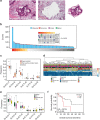
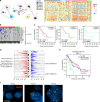
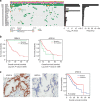
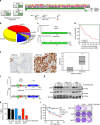
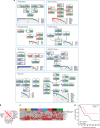
Comment in
-
Pancreatic cancer: Targeting KRAS and the vitamin D receptor via microtubules.Nat Rev Clin Oncol. 2015 Aug;12(8):442-4. doi: 10.1038/nrclinonc.2015.125. Epub 2015 Jul 14. Nat Rev Clin Oncol. 2015. PMID: 26169922 No abstract available.
References
Publication types
MeSH terms
Substances
Associated data
Grants and funding
LinkOut - more resources
Full Text Sources
Other Literature Sources
Medical
Molecular Biology Databases
Research Materials
Miscellaneous

